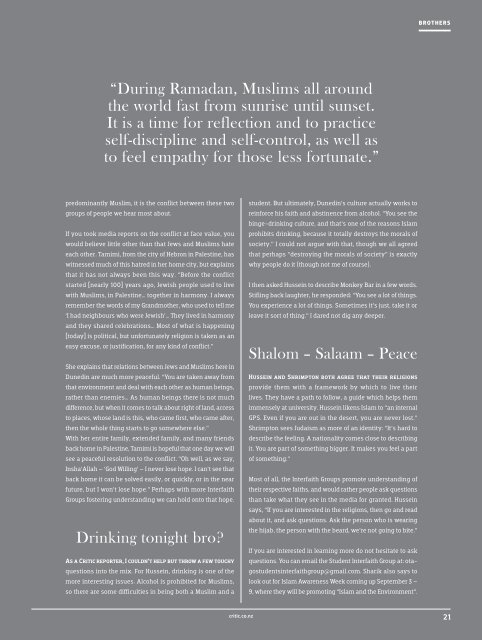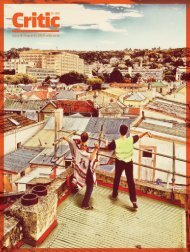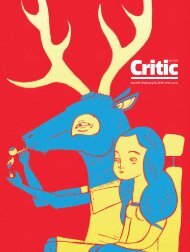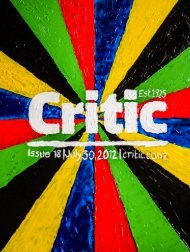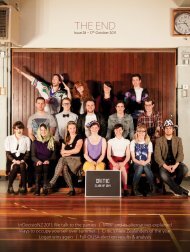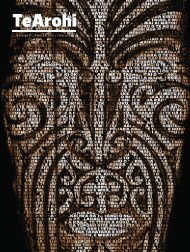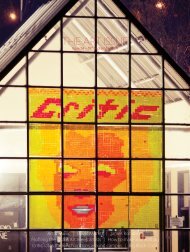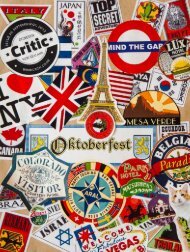Issue 20 | August 13,2012 | critic.co.nz
Issue 20 | August 13,2012 | critic.co.nz
Issue 20 | August 13,2012 | critic.co.nz
Create successful ePaper yourself
Turn your PDF publications into a flip-book with our unique Google optimized e-Paper software.
“During Ramadan, Muslims all around<br />
the world fast from sunrise until sunset.<br />
it is a time for reflection and to practice<br />
self-discipline and self-<strong>co</strong>ntrol, as well as<br />
to feel empathy for those less fortunate.”<br />
predominantly Muslim, it is the <strong>co</strong>nflict between these two<br />
groups of people we hear most about.<br />
If you took media reports on the <strong>co</strong>nflict at face value, you<br />
would believe little other than that Jews and Muslims hate<br />
each other. Tamimi, from the city of Hebron in Palestine, has<br />
witnessed much of this hatred in her home city, but explains<br />
that it has not always been this way. “Before the <strong>co</strong>nflict<br />
started [nearly 100] years ago, Jewish people used to live<br />
with Muslims, in Palestine… together in harmony. I always<br />
remember the words of my Grandmother, who used to tell me<br />
‘I had neighbours who were Jewish’… They lived in harmony<br />
and they shared celebrations… Most of what is happening<br />
[today] is political, but unfortunately religion is taken as an<br />
easy excuse, or justification, for any kind of <strong>co</strong>nflict.”<br />
She explains that relations between Jews and Muslims here in<br />
Dunedin are much more peaceful. “You are taken away from<br />
that environment and deal with each other as human beings,<br />
rather than enemies… As human beings there is not much<br />
difference, but when it <strong>co</strong>mes to talk about right of land, access<br />
to places, whose land is this, who came first, who came after,<br />
then the whole thing starts to go somewhere else.”<br />
With her entire family, extended family, and many friends<br />
back home in Palestine, Tamimi is hopeful that one day we will<br />
see a peaceful resolution to the <strong>co</strong>nflict. “Oh well, as we say,<br />
Insha’Allah – ‘God Willing’ – I never lose hope. I can’t see that<br />
back home it can be solved easily, or quickly, or in the near<br />
future, but I won’t lose hope.” Perhaps with more Interfaith<br />
Groups fostering understanding we can hold onto that hope.<br />
Drinking tonight bro?<br />
As a Critic reporter, I <strong>co</strong>uldn’t help but throw a few touchy<br />
questions into the mix. For Hussein, drinking is one of the<br />
more interesting issues. Al<strong>co</strong>hol is prohibited for Muslims,<br />
so there are some difficulties in being both a Muslim and a<br />
<strong>critic</strong>.<strong>co</strong>.<strong>nz</strong><br />
student. But ultimately, Dunedin’s culture actually works to<br />
reinforce his faith and abstinence from al<strong>co</strong>hol. “You see the<br />
binge-drinking culture, and that’s one of the reasons Islam<br />
prohibits drinking, because it totally destroys the morals of<br />
society.” I <strong>co</strong>uld not argue with that, though we all agreed<br />
that perhaps “destroying the morals of society” is exactly<br />
why people do it (though not me of <strong>co</strong>urse).<br />
I then asked Hussein to describe Monkey Bar in a few words.<br />
Stifling back laughter, he responded: “You see a lot of things.<br />
You experience a lot of things. Sometimes it’s just, take it or<br />
leave it sort of thing.” I dared not dig any deeper.<br />
shalom – salaam – Peace<br />
Hussein and Shrimpton both agree that their religions<br />
provide them with a framework by which to live their<br />
lives. They have a path to follow, a guide which helps them<br />
immensely at university. Hussein likens Islam to “an internal<br />
GPS. Even if you are out in the desert, you are never lost.”<br />
Shrimpton sees Judaism as more of an identity: “It’s hard to<br />
describe the feeling. A nationality <strong>co</strong>mes close to describing<br />
it. You are part of something bigger. It makes you feel a part<br />
of something.”<br />
Most of all, the Interfaith Groups promote understanding of<br />
their respective faiths, and would rather people ask questions<br />
than take what they see in the media for granted. Hussein<br />
says, “If you are interested in the religions, then go and read<br />
about it, and ask questions. Ask the person who is wearing<br />
the hijab, the person with the beard, we’re not going to bite.”<br />
If you are interested in learning more do not hesitate to ask<br />
questions. You can email the Student Interfaith Group at: otagostudentsinterfaithgroup@gmail.<strong>co</strong>m.<br />
Sharik also says to<br />
look out for Islam Awareness Week <strong>co</strong>ming up September 3 –<br />
9, where they will be promoting “Islam and the Environment”.<br />
brothErs<br />
21


